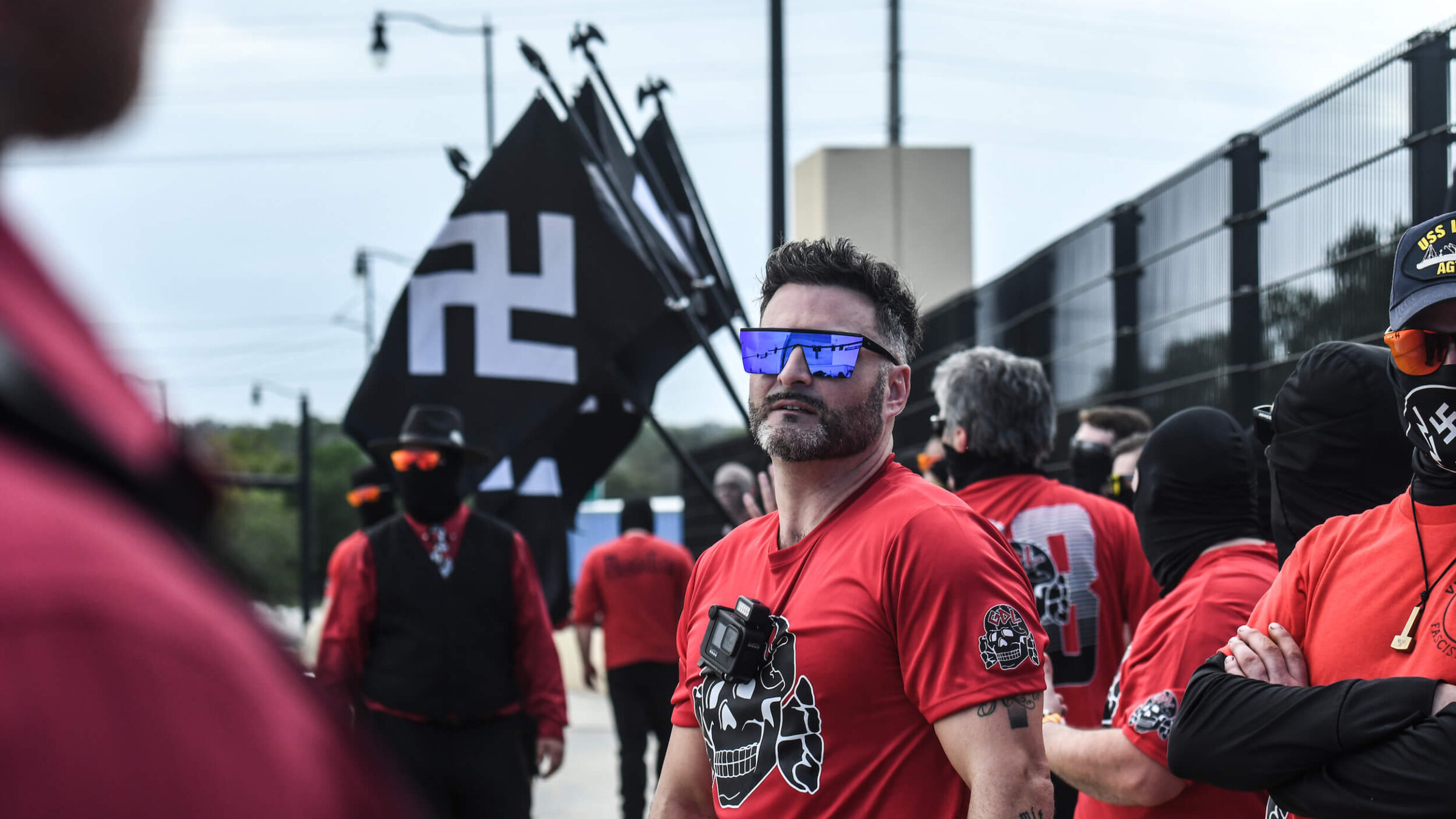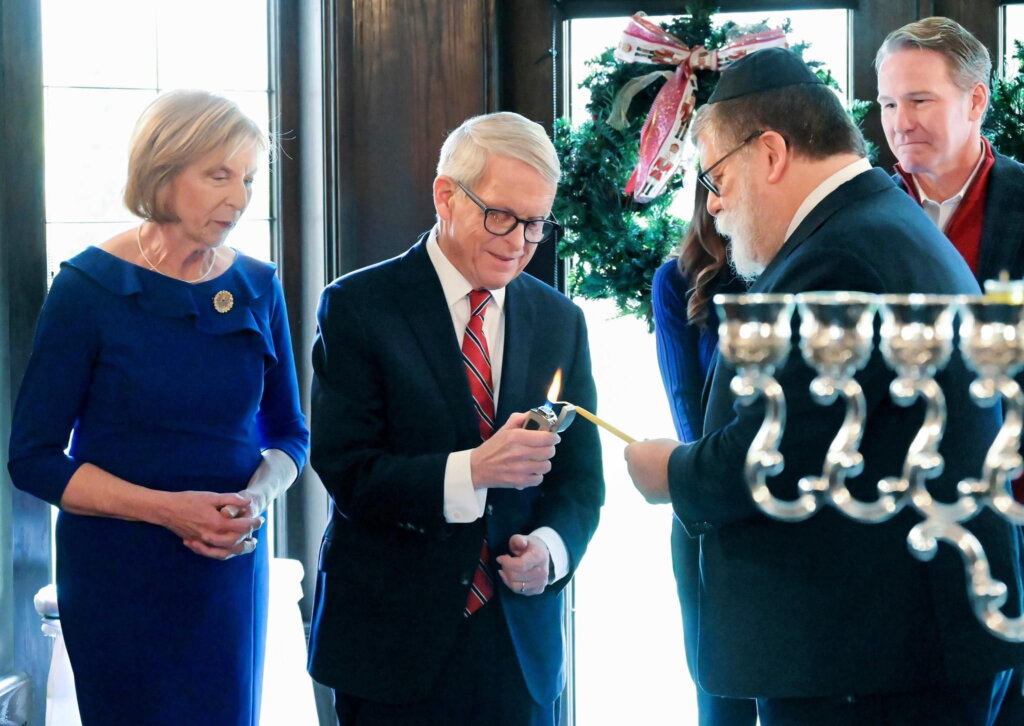I’m a rabbi in Columbus. Here’s my answer to the neo-Nazis.
Columbus neo-Nazis wanted fear; they got Jewish pride Instead

Joe Minadeo, leader of the antisemitic hate group the Goyim Defense League, rallies with another neo-Nazi group, Blood Tribe, on Sept. 2, 2023 in Orlando, Florida. Photo by Stephanie Keith/Getty Images
Nazis waving swastika flags. Masked thugs chanting antisemitic slogans on city streets. Prior to last Saturday, I had relegated grotesque scenes like these to the dustbins of history. My late father, who lived through the Nazi occupation of Czechoslovakia and survived seven concentration camps, used to describe marches like this from his youth. While I am aware that neo-Nazis once marched in Skokie and later in Charlottesville, I never truly thought this could happen in Columbus, the city I’ve proudly called home for the past 33 years.
The march last Saturday afternoon involved only a dozen men and lasted less than an hour, but it had a chilling impact. A small group of neo-Nazis paraded through the Short North, a trendy arts and culture neighborhood less than a mile from where, every Friday, my son Rabbi Yitzhak Kaltmann visits his congregants to wrap tefillin, hand out candles and wish them a good Shabbos. This is the heart of where our growing Jewish young professionals community lives, shops, and socializes.
Thankfully, local, state and federal officials quickly and unequivocally condemned the march. Governor Mike DeWine, with whom we light the Menorah every year at the governor’s mansion and who has visited our Chabad house three times over the years, publicly stated via X: “We will not tolerate hate in Ohio. There is no place in this state for hate, bigotry, antisemitism, or violence, and we must denounce it wherever we see it.”
We shouldn’t take it for granted that we live in a country where leadership at all levels recognizes the importance of confronting antisemitism head on. From President Joe Biden’s National Strategy to Counter Antisemitism, passed in 2023, to strong statements from President-elect Donald Trump, Jews know that politicians on both sides will work to keep us safe..
These institutional responses are critically important. However, they address only part of the challenge. The reality is that the voices of hate — while far outnumbered by voices of love and support — have an outsized impact. My phone has been buzzing nonstop with community members sharing how they’ve never felt this unsafe as Jews in America. One of our Hebrew school students, a 12-year-old girl, approached me with tears welling up in her eyes, confiding that she didn’t want to tell her best friend that she’s Jewish.
“What if she won’t eat lunch with me anymore?” she asked.
The question for me as a communal leader is how to help my community heal and find strength amid the hate.

The answer, I believe, lies in the teachings of my mentor and spiritual teacher Rabbi Menachem M. Schneerson, of righteous memory. Known simply as the Rebbe, he experienced significant antisemitism in Europe—from hiding from pogroms in Czarist Russia, to persecution under Soviet rule, and even Nazi oppression during his studies in Berlin, where his brother and sister-in-law were murdered during the Holocaust.
Despite his personal experience, his teachings about antisemitism were characteristically noncombative. He preached that the most effective way to combat darkness — physical, spiritual or societal — is to transform it into light. While fear and anger are often the first reaction to instances of hate, the Rebbe encouraged Jews to channel these dark moments into opportunities to engage more meaningfully with their Jewish identity.
Following the devastating Tree of Life shooting in 2018, Carly Pildis, director of community engagement for the Anti-Defamation League, advocated this approach when she said: “To those looking for comfort, do something Jewish this week. Study Torah. Deepen (or start) your commitment to kashrut. Go to synagogue; join a synagogue. Fight hate with love for your culture.”
This approach — meeting hatred with positive action — not only strengthens us but inspires others. While we can and should condemn antisemitism, we must also nourish and uplift ourselves through connection to our heritage.
Being Jewish is not just about standing up to hate; it’s about connecting deeply with our traditions and spreading our values of kindness and compassion.
The Rebbe often emphasized that each of us has a unique mission to uplift the world through acts of goodness. Whether it’s helping a neighbor, supporting a community initiative, giving our children a Jewish education, or simply showing up to synagogue with pride, every positive action helps dispel the shadows of hate and uplift our spirits.
A question I have received repeatedly this week is whether Columbus Chabad will have a smaller public Chanukah celebration and menorah lighting in light of the neo-Nazi march. My answer is, “No way.” We owe it to our children to have the celebration be bigger, brighter and more filled with Jewish pride than ever.
The neo-Nazis who marched in Columbus sought to create fear and division. Instead, they revealed the resilience and strength of our community. For every voice of hate, there are thousands more rising in love and support. This is our message in the face of those who wave the swastika on the streets of Columbus: that Judaism is not a burden to bear, but a light to share with the world.
















